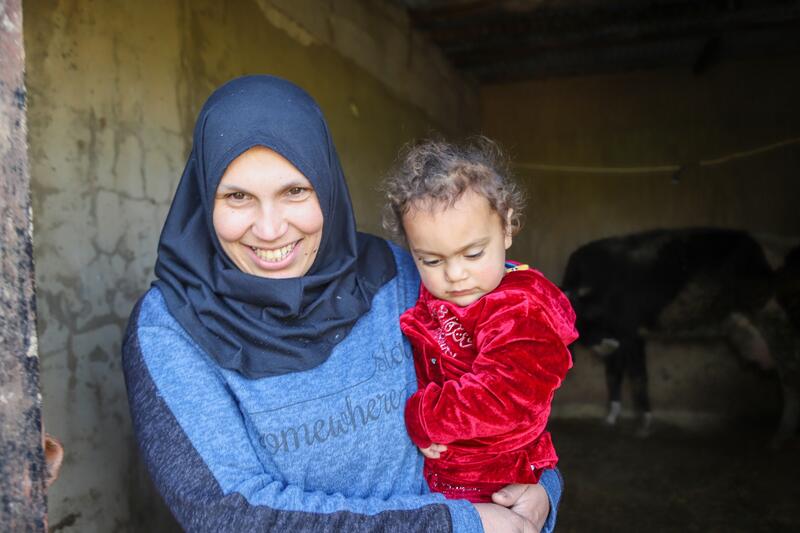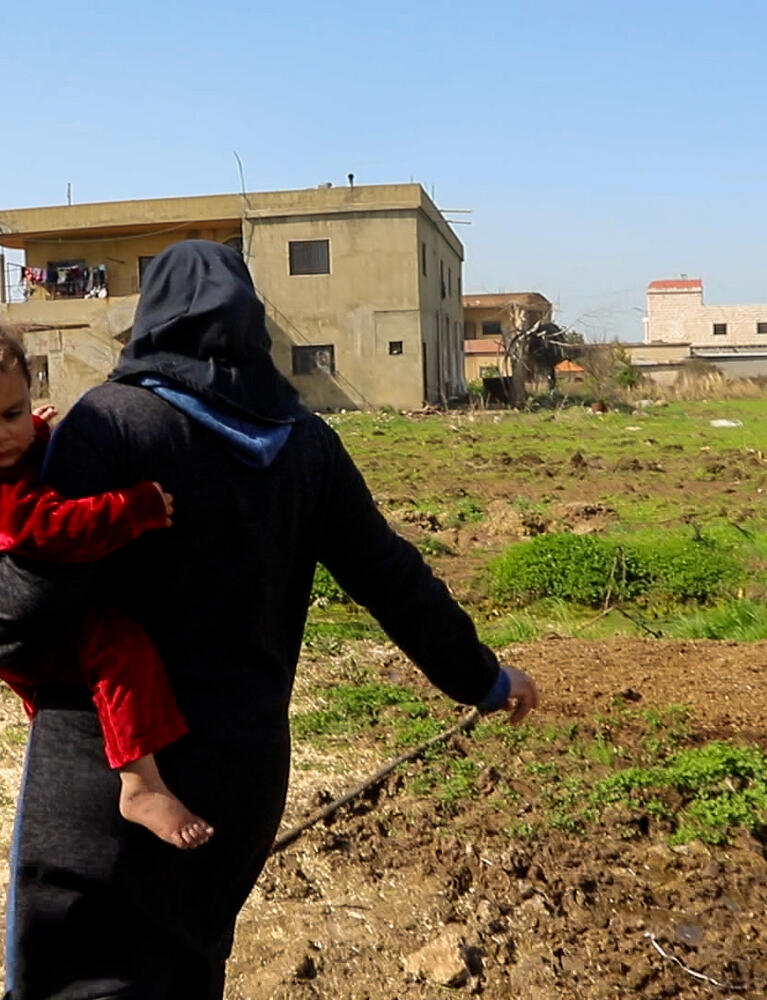As Lebanon's crisis exacerbates the hardships of neglected communities, Médecins Sans Frontières (MSF) is providing routine vaccinations for children in Wadi Khaled, a region with one of the country's lowest immunisation rates.
“I have to choose between feeding my children and taking them to a doctor,” says Aahd as she holds her 1-year-old boy tight, afraid that he might hurt himself on the open balcony of their unfinished home. Aahd and her family live in Wadi Khaled, one of the most impoverished and neglected areas in northern Lebanon’s Akkar district bordering central-west Syria.
The family are one of many in Wadi Khaled who had nothing to spare beyond necessities even long before Lebanon’s compounded crisis, and as a consequence of the deteriorating situation are now forced to pick and choose between their basic needs. “My husband does some fieldwork here and there, and our income barely covers our expenses for food, water and electricity,” says Aahd. “You feel very helpless when you can’t provide basic essentials for your kids,” says Aahd. “A simple jab has secured long-term prevention against illness for my child.” Lebanon has always had various communities that struggle to make ends meet but located in run-down suburbs and remote villages they have been out of sight amid long time projected image of Lebanon’s wealth – a notion far from reality and public discourse today amid the country’s crisis.
Residents of Wadi Khaled, who didn’t become Lebanese citizens until the late 1990s due to historical and political mishaps throughout the establishment of Greater Lebanon in 1920, have Bedouin roots and a tribal identity. An estimated 1,600 residents in the area remain stateless to date. The community exists mainly on agriculture, as well as trade between Lebanon and Syria.
“On the good days, the monthly income of our family can reach around 350,00 Lebanese pounds (LBP) - what amounts today to US$24 because of the devaluation of the currency,” says Aahd. “To paint you a picture, a loaf of bread now costs 13,000 LBP and the price is only increasing. Before, 10,000 LBP used to cover three daily meals. Today, it can barely cover one meal. Many days my kids go to bed hungry.”
People forced to prioritise food over healthcare
More and more people in Lebanon are forced to prioritise food over accessing healthcare, in a country where medical care is heavily privatised. To avoid spending money on their health, many people delay seeking care until their condition becomes critical. By the time they decide to seek help, it is often already too late for preventive care measures and instead, they need to be hosipitalised, an even greater financial burden they cannot afford at all.

“As the proportion of impoverished Lebanese increases, communities already at the edge of poverty are more likely to neglect preventative care or to try to self-manage diseases,” says Marcelo Fernandez, head
of mission with Médecins Sans Frontières (MSF) in Lebanon. “What we are seeing in Wadi Khaled is a direct representation of that trend, and people who are already vulnerable are only hit harder.”
In Wadi Kaled, a 40 square kilometre region with more than 22 villages, there are no public primary healthcare centres and people must travel approximately 40 kilometres to reach a public hospital. On top of this are the increasing cost of transportation, another major barrier for seeking care.
MSF’s routine vaccination program in Wadi Khaled
One of the most tangible illustrations of the precarious health situation in Wadi Khaled is the number of children that are missing out on routine vaccination. This is extremely concerning in a country where measles outbreaks are recurrent and still struggling to maintain zero polio status. “There are no official numbers on the percentage of low immunisation coverage in Wadi Khaled, but the number of children who reach our clinic who have not received their hepatitis B vaccine, a vaccine which is given usually at birth, is an indicator of the low percentage of routine vaccine coverage,” explains Rana Hammoud, a nurse at the local MSF clinic.
As part of MSF’s primary healthcare activities in Wadi Khaled, our teams support the Ministry of Public Health’s immunisation program through providing routine vaccinations. Since 2021, MSF has fully vaccinated more than 5,000 children.
“The only way I managed to complete routine vaccinations for my children is through MSF,” says Aahd. “The limited existing health facilities in the area are run by local or international humanitarian actors, and not all of them provide all health services, and some of the services provided are not provided consistently.”
“The difficulty doesn’t only lie in the fact that there are not many health facilities, but also in how far away they are. Transportation costs are extremely expensive. I would need 10,000 LBPs per ride to reach a clinic, which is something people can’t afford here,” she says. To help overcome the barrier of transportation costs and facilitate better access to immunisation, MSF visits villages across Wadi Khaled to conduct weekly vaccination campaigns. MSF health promotion teams also organise weekly health awareness sessions to combat misconceptions and encourage people to take up routine vaccinations
Wadi Khaled an example of Lebanon’s national health status
Immunisation is just one of many essential medical services that people in Lebanon are being forced to forgo due to a lack of proper health service delivery, especially in neglected areas of the country. The situation is only worsening as Lebanon’s crisis intensifies. Since 2020, various studies have shown that Lebanon’s utilization of routine vaccine has declined 31% at the national level. This is due to COVID-19 pandemic lockdown measures, transportation cost barriers, and shortages of vaccines as the country struggles to import medical supplies and drugs. Fernandez says there are two consequences of this: “First, an increase in the number of people hospitalized with conditions that could have been prevented, will only add more pressure on an already very fragile health system. And secondly, although, patients may well have been able to minimize their expenses in the short term, in the end they will be facing enormous hospital fees that they are unable to cover since they have no private insurance, and the national insurance fund is fragmented.”



